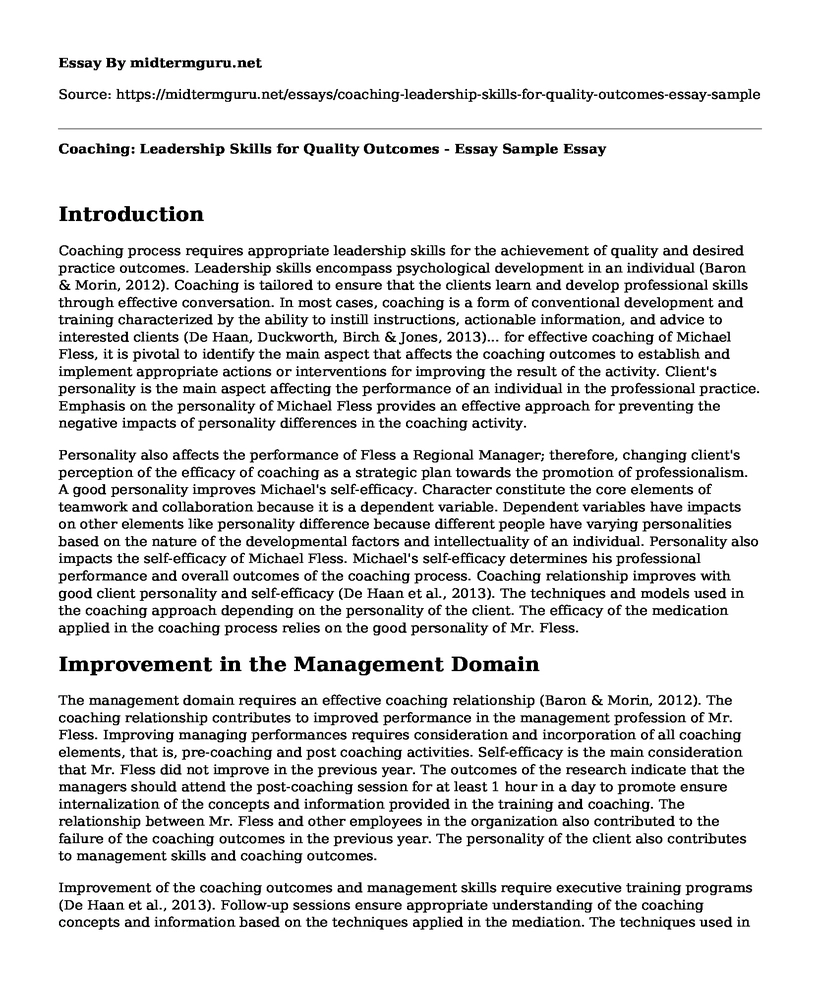Introduction
Coaching process requires appropriate leadership skills for the achievement of quality and desired practice outcomes. Leadership skills encompass psychological development in an individual (Baron & Morin, 2012). Coaching is tailored to ensure that the clients learn and develop professional skills through effective conversation. In most cases, coaching is a form of conventional development and training characterized by the ability to instill instructions, actionable information, and advice to interested clients (De Haan, Duckworth, Birch & Jones, 2013)... for effective coaching of Michael Fless, it is pivotal to identify the main aspect that affects the coaching outcomes to establish and implement appropriate actions or interventions for improving the result of the activity. Client's personality is the main aspect affecting the performance of an individual in the professional practice. Emphasis on the personality of Michael Fless provides an effective approach for preventing the negative impacts of personality differences in the coaching activity.
Personality also affects the performance of Fless a Regional Manager; therefore, changing client's perception of the efficacy of coaching as a strategic plan towards the promotion of professionalism. A good personality improves Michael's self-efficacy. Character constitute the core elements of teamwork and collaboration because it is a dependent variable. Dependent variables have impacts on other elements like personality difference because different people have varying personalities based on the nature of the developmental factors and intellectuality of an individual. Personality also impacts the self-efficacy of Michael Fless. Michael's self-efficacy determines his professional performance and overall outcomes of the coaching process. Coaching relationship improves with good client personality and self-efficacy (De Haan et al., 2013). The techniques and models used in the coaching approach depending on the personality of the client. The efficacy of the medication applied in the coaching process relies on the good personality of Mr. Fless.
Improvement in the Management Domain
The management domain requires an effective coaching relationship (Baron & Morin, 2012). The coaching relationship contributes to improved performance in the management profession of Mr. Fless. Improving managing performances requires consideration and incorporation of all coaching elements, that is, pre-coaching and post coaching activities. Self-efficacy is the main consideration that Mr. Fless did not improve in the previous year. The outcomes of the research indicate that the managers should attend the post-coaching session for at least 1 hour in a day to promote ensure internalization of the concepts and information provided in the training and coaching. The relationship between Mr. Fless and other employees in the organization also contributed to the failure of the coaching outcomes in the previous year. The personality of the client also contributes to management skills and coaching outcomes.
Improvement of the coaching outcomes and management skills require executive training programs (De Haan et al., 2013). Follow-up sessions ensure appropriate understanding of the coaching concepts and information based on the techniques applied in the mediation. The techniques used in the training and coaching should focus on improving the leadership skills of the Mr.Fless based on his behavior. The psychotherapy provides crucial information that can lead to self-efficacy and good personality. The analysis of the coaching outcomes from the previous years should be used to identify the appropriate interventions for the program. I will also use the outcomes the previous sessions to identify the areas of weakness which need improvement. Efforts should also focus on improving interpersonal relationship and interaction in the coaching to improve the client's perception of the techniques applied in the induction and training sessions. Executive coaching improves the performance of the manager in his profession because a comparison of the outcomes enables the professional to adopt post-coaching measures.
References
Baron, L., & Morin, L. (2012). The Working Alliance in Executive Coaching: Its Impact on Outcomes and how Coaches can Influence It. Coaching Relationships, 213-226.
De Haan, E., Duckworth, A., Birch, D., & Jones, C. (2013). Executive Coaching Outcome Research: The Contribution of Common Factors such as Relationship, Personality Match, and Self-efficacy. Consulting Psychology Journal: Practice and Research, 65(1), 40.
Cite this page
Coaching: Leadership Skills for Quality Outcomes - Essay Sample. (2023, Jan 20). Retrieved from https://midtermguru.com/essays/coaching-leadership-skills-for-quality-outcomes-essay-sample
If you are the original author of this essay and no longer wish to have it published on the midtermguru.com website, please click below to request its removal:
- Essay on Why Alibaba Would Want to Purchase Airbnb
- Management Control Systems in Healthcare
- Comparison of Poems About Love - Paper Example
- Essay Sample on Business Ethics: Executive Compensation
- Experience with Psychiatrists - Essay Sample
- Evaluation Essay on eBay Incorporation
- SWOT Analysis on Connectivity, Culture, and the Future of Work at Uber







